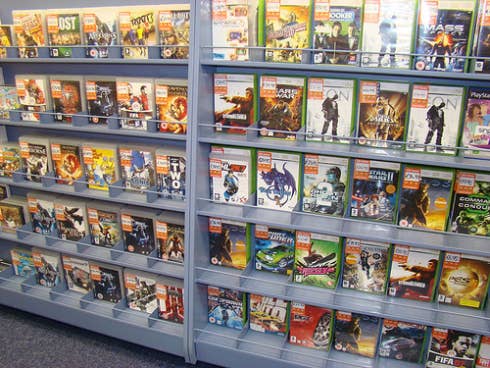The Nuclear Option on Used Games
If console makers actually cut out pre-owned what would the impact be?
Used games have been a a whipping boy for the industry for a number of years now. I'm not quite sure exactly when it became the oft-cited subject it is today, but I believe it started during this current console cycle, when the cost to develop AAA titles geometrically increased again over the previous generation while the number of top-flight developers and publishers noticeably shrank. With the pre-owned boom coinciding with a significant global economic downturn, it's no wonder that people in the industry are looking at ways revenue is being denied them and lashing out.
I find it ironic on a certain level since the industry has had something of a love/hate relationship with GameStop. While it's the top dedicated video game retailer in the US, and often supported with exclusive pre-order bonuses for games both large and small, it is also the main cog in the used game sale machine. It's hard not to talk about used games and GameStop in the same sentence since their size and logistical advantages mean they generate $1.2 billion in revenue from used games.

There's been a lingering tension between the industry and used game sales for some time that has manifested in different ways. This cold war with used games has been going for some time now - with things like day one DLC and online passes seeking to undermine or at least capitalize with some revenue from those used game buyers. Despite this tension, I always figured it would be something that the industry would just have to live with, but there are indications this war will be turning red hot very soon with console makers exercising the "nuclear" option.
"Any anti-used game measure will limit access younger gamers have to newer games, perhaps driving said players more towards cheaper and free-to-play options, more so than they already are doing"
Rumors recently started coming out that the next Xbox will not be backwards compatible, won't allow used games to be played and might not even have an optical disc drive. More recently and notably, however, an insider source said that the next PlayStation (nicknamed Orbis) will not offer backwards compatibility and will tie retail copies to particular PSN accounts, leaving used copies in limbo.
It's worth noting that the lack of backwards compatibility will also undercut used games to a degree, since it means in order to play games from previous generations on the Orbis, you'll have to buy them on PSN.
If things unfold as they are rumored, it could be argued that mandatory DRM is coming to every game on the Orbis. Some have labeled consoles as DRM in and of themselves - being closed systems that are heavily controlled by their manufacturers - but this would be a much more obvious and intrusive measure than consumers are used to dealing with.
Having to enter a code and register every new title smacks of the sort of things that PC players have had to endure for years. Retail copies of PC titles have long since had registration codes, necessary to install and play them. Recent years have seen more invasive forms of DRM, from ones that install firmware on your computer, to others that require a constant Internet connection while playing and still others that limit the number of installs for every copy of the game.
I bring up the PC retail market as a reminder of the fact that all of these security measures have simply not worked. Even games like Witcher 2, which is a PC title first and released by a developer that considers DRM abhorrent, are pirated quite heavily and in any given month PC retail sales comprise only about 5 percent of the total retail market. DRM has not saved core PC game sales at retail; it could in fact be argued that they hastened its general demise to secondary place in most retail stores, shunted off to some small corner.
Perhaps I'm more sensitive about this than most because I remember my own past. A decade ago I was a poor college student, and bought many games used because I got more bang for the buck. While my purchases are almost exclusively new now, I'm worried that any anti-used game measure will limit access younger gamers have to newer games, perhaps driving said players more towards cheaper and free-to-play options, more so than they already are doing.

The question I've always wondered when developers speak of piracy and used games in the same breath is: how do consumers feel about this subject? I'm a firm believer in the fact that gaming is a service industry, living at the benefit of what consumers are willing to pay. This anti-used games measure rings of something decidedly anti-consumer, benefiting the powers that be in the industry but saddling consumers with the reality that whatever game they buy, no matter how much they may end up disliking it, will be theirs in-perpetuity with no recourse.
The initial reaction to this rumor has been largely negative, with gamers lashing out on gaming forums and even analysts criticizing the move. On GameFAQs.com (and granted this is not a scientific poll in the least) over 70 percent of gamers indicated that they would not be able to live without having used games as an option - a number that shoots to well over 80 percent when accounting for PS3 backwards compatibility as well. If the goal of a business is to do right by your customers, the industry should know that their most loyal and dedicated followers are downright peeved at this news.
Since this is still all at the theoretical stage, it could be argued that this measure will lower prices on new games, given the reverse argument that used games have been driving up game prices. That would certainly be a boon for consumers but considering how next-gen games are expected to be at least a couple times more expensive than games from this generation, I have serious doubts that publishers would want to eliminate the $60 premium price point, not to mention the $80 and more that collector's editions cost.
"It'd be ironic if the oft predicted death of consoles were actually precipitated by the manufacturers themselves"
Cutting out used games seems to be another step towards the obsolescence of retail sales while pushing things more into the digital realm, though I must confess I have little trust in console manufacturers to control pricing of their own games. Many current-gen games are increasingly being offered via PSN/Xbox Live and they tend to be very slow to drop in price. Valve has done a good job of offering sales on Steam, and this tends to drive prices aggressively down across the whole PC gaming market. If used games are to be eliminated or at least discouraged, then it would seem that the console market might have to follow that sort of pricing scheme, though I wonder if games going for $10 six months after they shipped is really any better than having some games sold used...
It's ultimately difficult to predict what market factors will help suss things out in the end, but this move against used games poses many questions to which there are no immediate answers. For instance, what does this mean for the physical rental market? What if someone wants to take their game over to a friends house - is that no longer an option unless I log into my PSN account? Will things work smoothly if their system breaks and they need to get a replacement?
Maybe I'm overestimating the significance of this moment. Maybe most game purchases are one-offs and consumers won't mind. Maybe there will be a significant benefit like being able to download a copy of any game you register to your account that will outweigh any disadvantages. Maybe the fee for activating a used game will be small and everyone will be happy. Still, things are already rocky from a PR standpoint and Sony hasn't even officially announced the existence of the next PlayStation.
The powers that be better hope this plan goes well and that gamers won't do something drastic like rebel en masse and mod all of their consoles to spite them or simply take their dollars elsewhere. It'd be ironic if the oft predicted death of consoles were actually precipitated by the manufacturers themselves, and as a big fan of playing games on consoles, I certainly hope they don't screw it all up.

